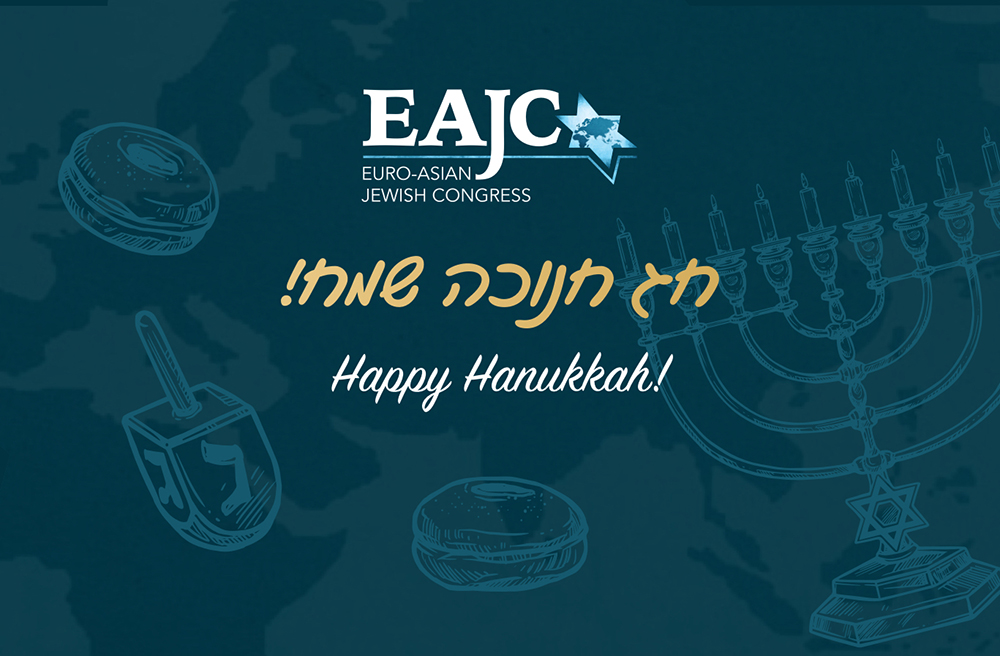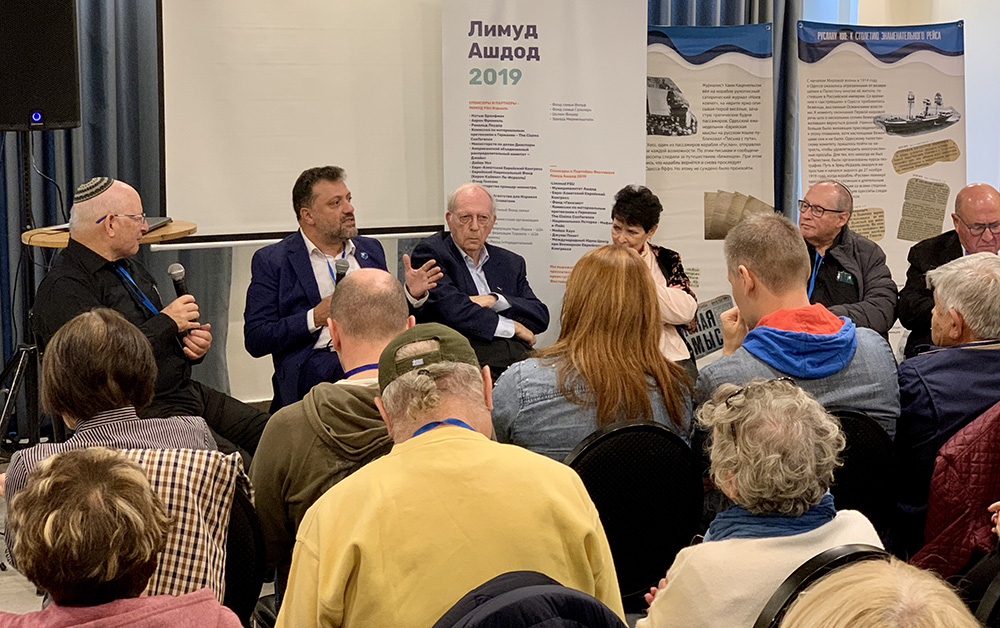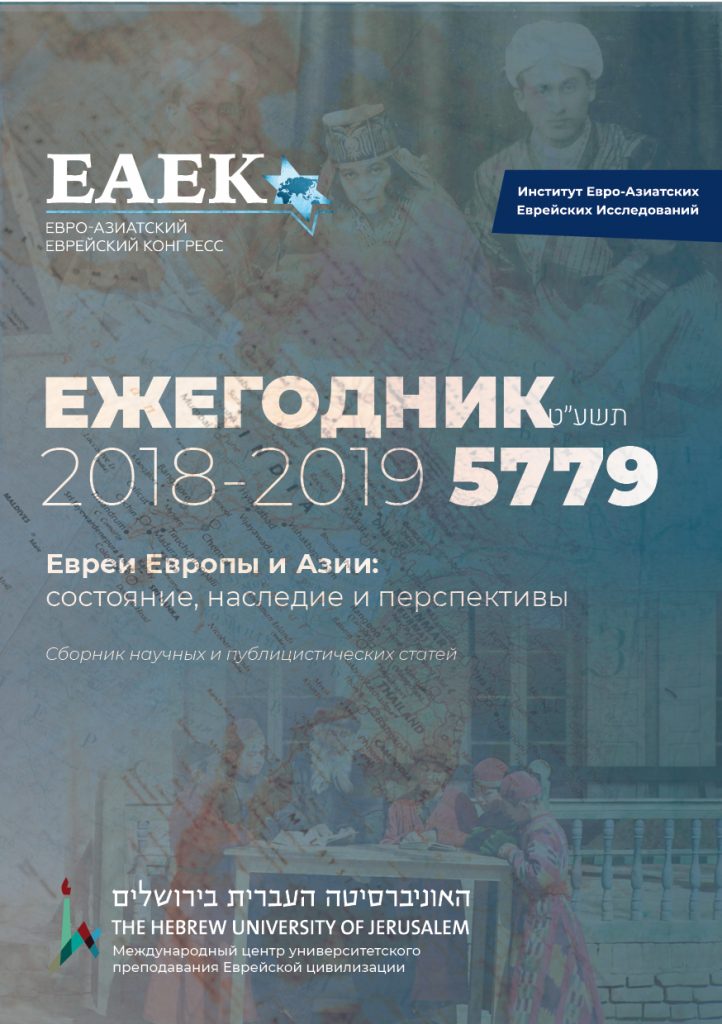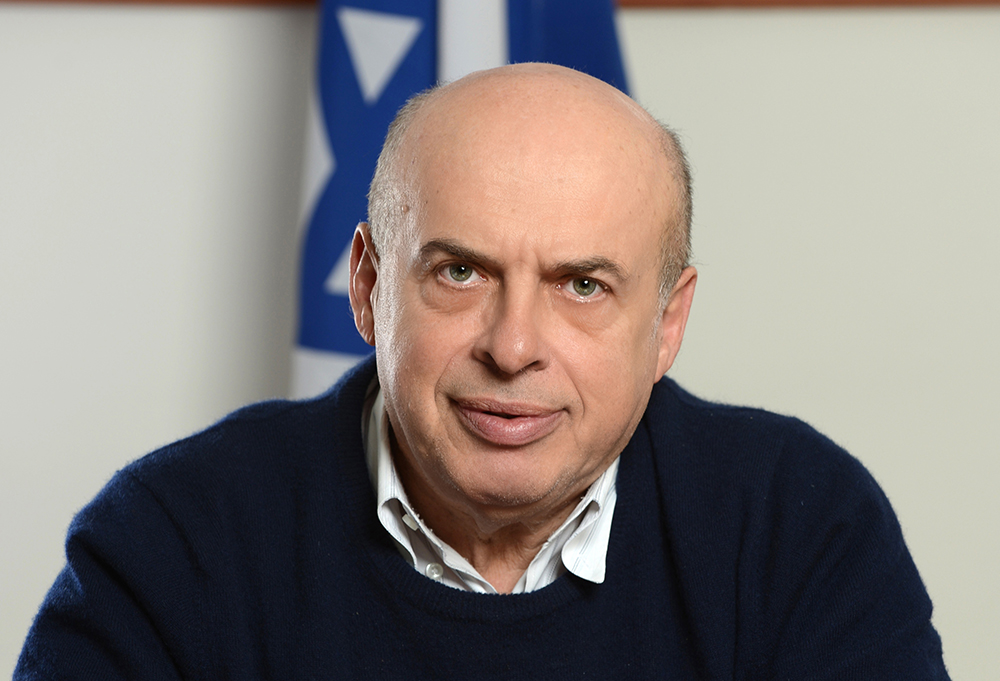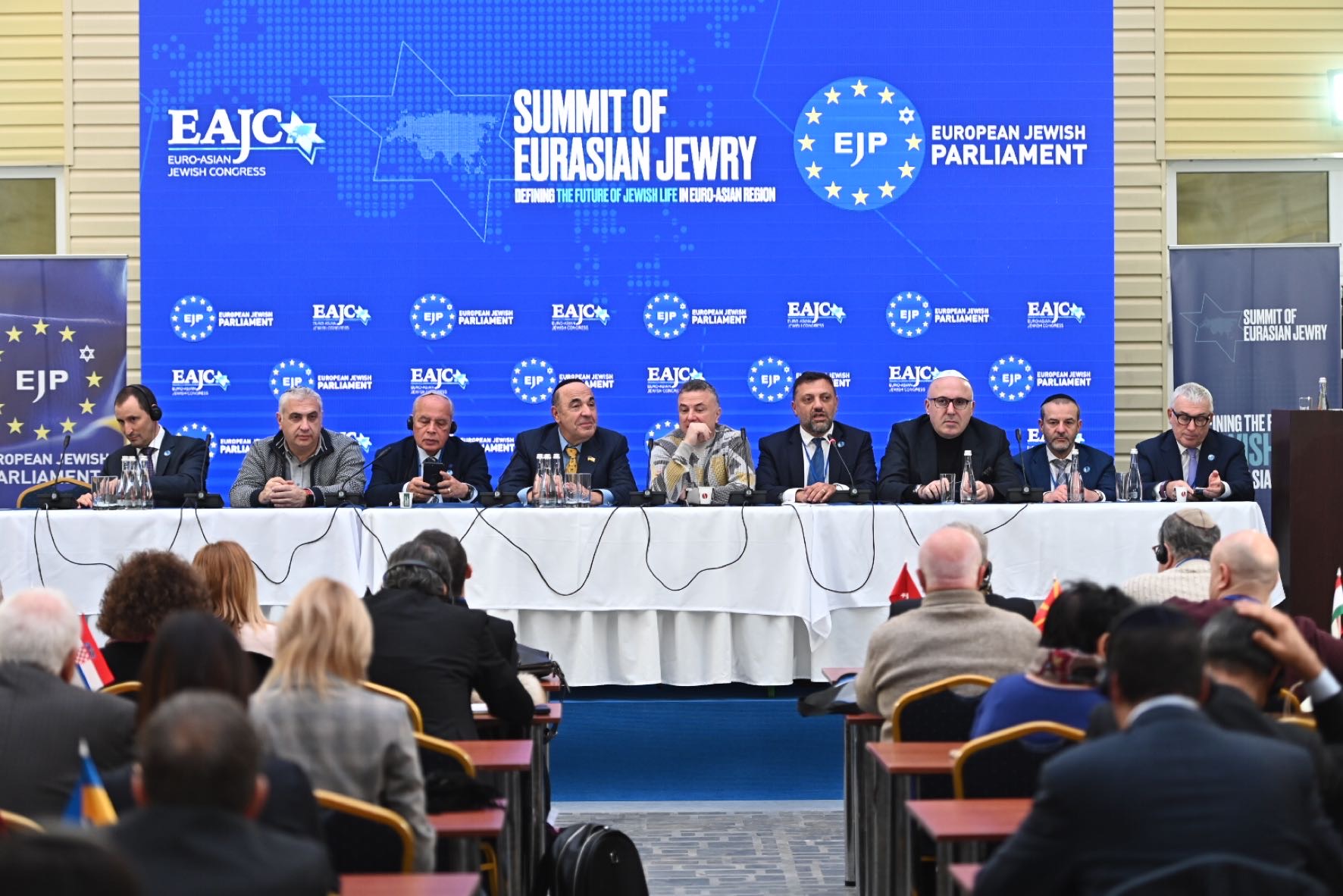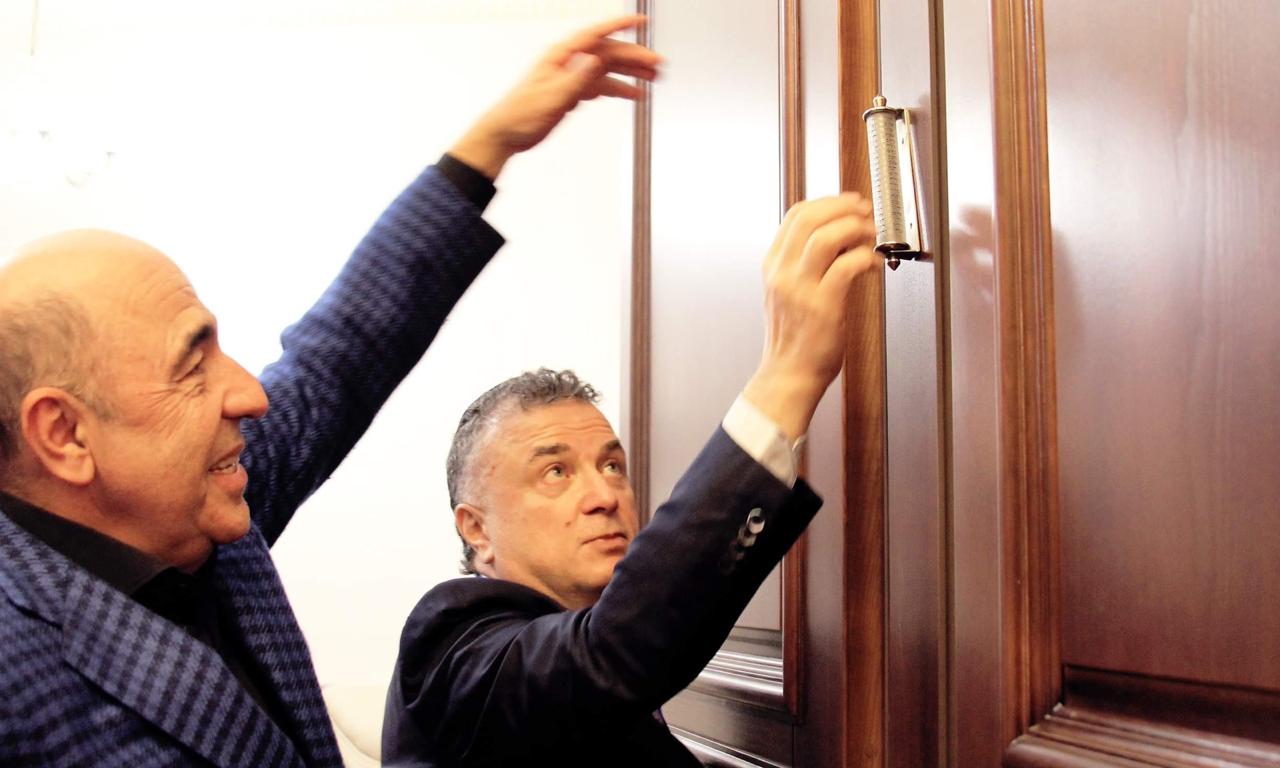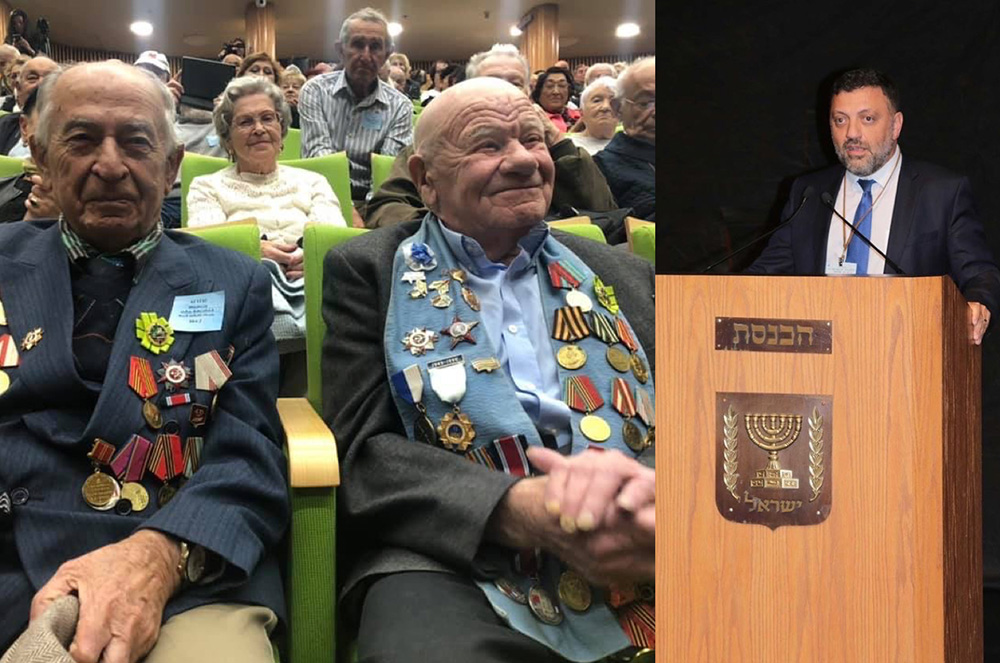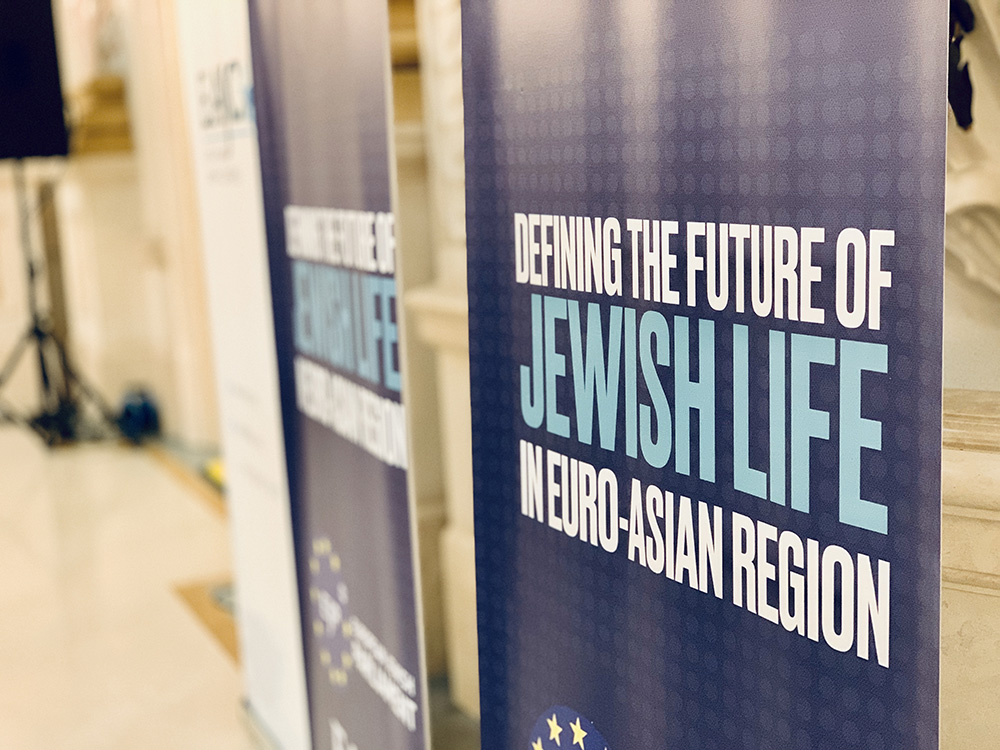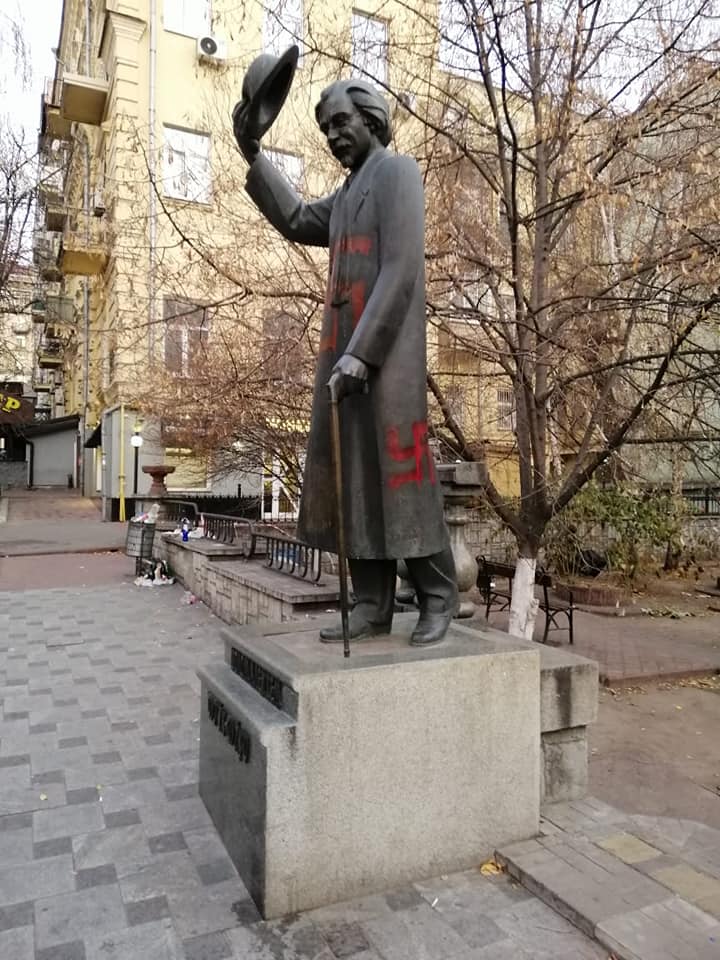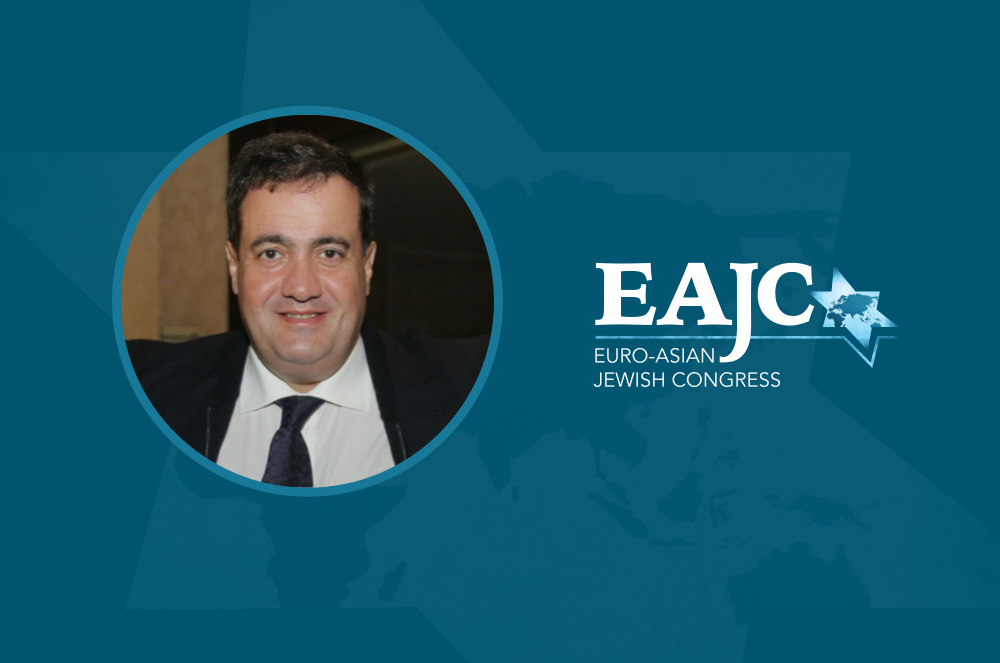More than 700 Russian-speaking Israelis and public figures gathered at Limmud FSU Israel in Ashdod
The international educational organization, Limmud FSU celebrated its bat-mitzvah – 12 years of educational activities in Israel with a three-day festival in Ashdod. The pluralistic conference, run entirely by volunteers, attracted more than 700 young Russian-speaking Israelis.
The festival encompassed more than 150 lectures, workshops, round-table discussions, master classes, and artistic performances given by 100 presenters, on a wide range of subjects of Jewish interest.
EAJC General Director, Dr. Haim Ben Yaakov, together with prof. Dina Porat, a chief historian of Yad Vashem; Justice Elyakim Rubinstein, the former Deputy-President of the Supreme Court; Ambassador Efraim Halevi; and Ambassador Uri Palti, participated in the round-table discussion about the rise of antisemitism and the far right, presented by Dr. Yoel Rappel.
Dr. Haim Ben Yaakov emphasized: “In the new law on the national state, the State of Israel for the first time declared its commitment to the common fate of the Jewish people, the principle of unity of the Jewish people, and the value of the relationship between Jews wherever they live. It is this aspect of the law that is vital and worthy of support. Israel must take a greater spiritual and political responsibility for the Jewish communities of the world.”
Among the festival’s highlights was the inauguration of an exhibition in honor of Justice Rubinstein, curated by Prof. Aviad HaCohen, Dean of the Sha’arei Hamishpat College of Law. The festival also featured a memorial to the late Russian cosmonaut, Alexei Leonov, the first man to walk in space who passed away in October. The event featured a message from the American astronaut Garrett Reisman, who was a guest of honor together with Leonov at Limmud FSU 2011 in Beersheba.
“Unity is a much needed today more than ever, and Limmud FSU has been uniting people for many many years now. The Diaspora cries out for Limmud, and unfortunately, we are currently losing parts of our human reserve and support of the Jews worldwide. Therefore, it is crucial that each and every one of us do his and her best to be together, to volunteer, to deepen and strengthen Jewish identity, and to be involved in the life of the Jewish people,” said Limmud FSU President and EAJC Chairman of the Board, Aaron G. Frenkel.
“By consistently supporting the Limmud FSU conference, we at the Euro-Asian Jewish Congress are convinced of the need to further develop this important project, based on a fresh, modern approach to traditional Jewish values,” said EAJC President Dr. Mikhail Mirilashvili.
Photos courtesy of Alex Khanin and Limmud FSU.
Euro-Asian Jewish Congress Yearbook released
The Euro-Asian Jewish Congress Yearbook “Jews of Europe and Asia: State, Heritage, and Prospects” (Russian: “Евреи Европы и Азии: состояние, наследие и перспективы”) for 5779 (2018-2019) is released by the Institute of Euro-Asian Jewish Studies founded by EAJC, in academic cooperation with the Hebrew University of Jerusalem.
“The Euro-Asian Jewish Congress pays special attention to scientific research analyzing the ever-changing circumstances, characteristics, problems, and tasks on the agenda of the Jewish communities. In this way, we strive to nourish an informed discussion and visionary decisions regarding Jewish life in the Euro-Asian region, ”said EAJC President Dr. Mikhail Mirilashvili.
The EAJC Yearbook opens with an article by EAJC General Director, Dr. Haim Ben Yaakov who analyzes the history and activities of the Congress as a specific organizational phenomenon that arose in the context of the processes generated by the collapse of the socialist bloc, mass Jewish emigration, and the revival of Jewish communities in the post-Soviet space.
The Yearbook contains a conceptual essay by the ethnographer and literary critic Dr. Velvl Chernin on the boundaries of the current Eurasian and FSU Jewry as well as an article by the professor of Ariel University and Chair of Academic Council of the Institute for Euro-Asian Jewish Studies (IEAEI), Zeev (Vladimir) Hanin who analyzes the sociological aspects of the controversy about the size of the “ethnic core” and the “expanded Jewish population” in the countries of the former USSR.
On the pages of the Yearbook, the historian and orientalist Dr. Dmitri Shevelev, using the example of the Jewish community of Moldova, has analyzed the relevance of the idea of Jewish national-cultural autonomy today; Iranian expert Dr. Vladimir Messamed described the modern Iranian Jewish community; and head of the EAJC Strategic Council prof. Mikhail Chlenov highlighted the state and prospects of Jewish ethno-communal groups in India as well as the exotic Jewish community of Indonesia, the most populated Muslim country in the world.
Considerable attention was paid to the state of academic and applied Jewish studies in the post-Soviet space. Dr. Konstantin Bondar devoted an article to the Kharkiv branch of the International Solomon University; associate professor of the Russian State University for the Humanities and Deputy Director of the Museum of Jewish History in Russia, Dr. Maria Kaspina described the experience of Jewish museum work in the post-Soviet space; and from the review by Dr. Artem Fedorchuk you will learn about the Jewish cemeteries study restoration project in Ukraine, Belarus, and Moldova. While the associate professor of the Institute of Asian and African Countries at Moscow State University, Dr. Alexandra Polyan, wrote about a large-scale system for studying and teaching Hebrew.
The Yearbook concludes with a series of articles on the historical aspects of the relationship between Euro-Asian Jews, Israel, and the Zionist movement. Among them are the article by a Jerusalem researcher, Dr. Yair Paz who introduced the phenomenon of the Georgian quarter in Jerusalem, and the article by Dr. Joseph Brener who analyzed the idea of Jewish statehood outside of Israel.
Releasing the Yearbook, the EAJC regularly provides a timely overview of Jewish life in the Euro-Asian region to the Jewish public, the scientific community and the leadership of the states relevant to the EAJC Jewish communities. This important publishing project was initiated by EAEK President Dr. Mikhail Mirilashvili and EAEK Vice President, the President of the Institute for Euro-Asian Jewish Studies (IEAEI), Dr. Mark Shabad.
“On behalf of the EAJC, I would like to express my sincere gratitude to the brilliant academic experts who have made this important Yearbook possible. You’ve made a great work to turn the Yearbook “Jews of Europe and Asia: State, Heritage, and Prospects” into a platform for a free and in-depth scientific discussion on Jewish issues in the Euro-Asian region. We are pleased to invite experts in related fields to collaborate, ”said EAJC General Director, Dr. Haim Ben Yaakov.
Natan Sharansky named Bereshit Prize laureate for 2020
The Euro-Asian Jewish Congress congratulates the prominent statesman and public activist Natan Sharansky on receiving the Bereshit Prize 2020.
We highly value and share Mr. Sharansky’s implacable struggle against antisemitism and the delegitimization of Israel as well as his tireless contribution to the development of relations between the State of Israel and the Jewish communities in the diaspora.
We happily join the congratulations and wish Mr. Sharansky good health, enthusiasm, and further success in all his endeavors!
The first Summit of Eurasian Jewry held in Kyiv, Ukraine
“The establishment of the Summit of Eurasian Jewry is a historic event that testifies to the unity and mutual responsibility of the Jewish people and is aimed at the benefit of the Euro-Asian Jewish communities, including the development of educational and social projects in the region. This important Summit came together thanks to a strong partnership and fruitful cooperation of international organizations, such as the Euro-Asian Jewish Congress and the European Jewish Parliament,” said Dr. Mikhael Mirilashvili, president of the Euro-Asian Jewish Congress.
During the meeting, which took place as part of the first Summit of Eurasian Jewry in Kyiv, Ukraine, EAJC President called on the Ukrainian authorities to transfer the embassy to Jerusalem: “Among the initiators of the draft resolution on the transfer of the Ukrainian Embassy to Jerusalem are 86 deputies of the Ukrainian parliament. Given their kind support, I urge you to support the adoption of this important resolution, which will definitely strengthen the friendship between our people and states.”
The Chairman of the Verkhovna Rada of Ukraine Dmytro Razumkov assured EAJC President Dr. Mikhail Mirilashvili that he would study the issue further.
The Summit opened with the annual General Assembly of the Euro-Asian Jewish Congress (EAJC) followed by the first joint session of the EAJC and the European Jewish Parliament.
Neta Briskin-Peleg, head of the “Nativ” organization (the Prime Minister’s Office liaison group for the FSU and Jewish diaspora affairs), noted: “The leaders of the Euro-Asian Jewish Congress have consistently supported the State of Israel. The position to support Aliya to Israel, adopted at the Summit, is a significant step in this direction. The Israeli leadership highly appreciates Congress’s dedication to the Jewish people and the State of Israel.” KKL-JNF Chairman Daniel Atar has announced a strategic partnership between KKL-JNF and EAJC.
The Summit of Eurasian Jewry adopted a resolution on strengthening the role of youth in preserving Jewish heritage and development of Jewish life in the Euro-Asian region, emphasizing the importance of new modern techniques, innovative initiatives, and a creative approach in working with Jewish youth, including the student community, and in educating a new generation of Jewish leaders in Euro-Asian region.
In a unanimous resolution, the Summit called on the state leaders of the Euro-Asian region to take a firm position and prevent further escalation of antisemitism in the region. The Summit also urged the Jewish leaders of the Euro-Asian region to join a constructive dialogue on combating this shameful and dangerous phenomenon.
The Summit was attended by Jewish leaders from 32 countries of the Euro-Asian region, President of the Euro-Asian Jewish Congress (EAJC), Dr. Mikhael Mirilashvili, EAJC General Director, Haim Ben Yaakov, Executive Director of the All-Ukrainian Jewish Congress, Joseph Axelrod, Director of “Nativ”, Neta Briskin-Peleg, Advisor to the Prime Minister of Israel, Ariel Bulstein, Editor-in-Chief of Israel Hayom Boaz Bismuth, representatives of the World Jewish Congress, and other honorary guests.
Mezuzah placed at Ukrainian Parliament Building
President of the Euro-Asian Jewish Congress Dr. Michael Mirilashvili met with the Chairman of the Verkhovna Rada of Ukraine, Dmytro Razumkov.
During their first bilateral meeting, Dr. Michael Mirilashvili stressed the importance of preserving the historical memory of the Jewish community in Ukraine and taking a firm stand in view of the increasing number of acts of violence against Jewish religious, public, and educational institutions in order to prevent further escalation of antisemitic sentiment in the country.
In a moving ceremony following the meeting, a mezuzah was placed at the Parliament (Verkhovna Rada) building in Kyiv.
The Verkhovna Rada building is located at the Constitution Square. It is a typical example of neoclassical Soviet architecture from the Stalin-era. Home to a unicameral parliament, designed in a rectangular symmetric form with an octagonal session hall. The construction was initiated in 1936 and lasted until 1939. The red-and-blue Flag of Ukrainian SSR was flown on top of building for over 50 years, until it was replaced by the yellow-and-blue national Flag of Ukraine, following Ukraine’s independence in 1991.
The meeting was held in the framework of the first Summit of Eurasian Jewry opened today (November 27) in Kyiv. Jewish leaders from 32 countries of the Euro-Asian region are participating in the Summit, attended by President of the Euro-Asian Jewish Congress (EAJC), Dr. Michael Mirilashvili, EAJC Vice-Presidents Alexander Levin, Victor Naishuller and Moshe Shvets, EAJC General Director, Haim Ben Yaakov, Editor-in-Chief of Israel Hayom Boaz Bismuth, representatives of the World Jewish Congress, and other honorary guests.
Ceremony in honor of Holocaust survivors and WWII veterans held in Knesset
A ceremony in honor of Holocaust survivors and World War II veterans took place today in the Israeli Knesset. The ceremony was attended by Speaker of the Knesset, Yuli-Yoel Edelstein, Minister Zeev Elkin, numerous members of the Israeli parliament, a large delegation from Poland as well as leaders of associations of WW2 veterans and Holocaust survivors.
Speaking to those present, EAJC Director-General Haim Ben Yaakov said: “The Holocaust tragedy and World War II have become a turning point in the history of mankind. The civilized world has realized the mortal danger of anti-Semitism and has taken on a difficult responsibility to confront war and genocide.
The Euro-Asian Jewish Congress promotes the preservation of the memory of the Holocaust and the perpetuation of the memory of Jewish heroes of the Second World War. We must do everything in our power to stop the spread of neo-Nazi doctrines, combat the denial of the Holocaust and prevent a repetition of the terrible tragedy of our people.”
The first Summit of Eurasian Jewry opens in Kyiv, Ukraine
Today, Jewish leaders from 32 countries of the Euro-Asian region gathered in the capital of Ukraine, Kyiv, for the first Summit of Eurasian Jewry. The summit is attended by the President of the Euro-Asian Jewish Congress (EAJC), Dr. Mikhael Mirilashvili, the EAJC General Director, Haim Ben Yaakov, the Executive Director of the All-Ukrainian Jewish Congress, Joseph Axelrod, the Director of “Nativ”, Neta Briskin-Peleg, Advisor to the Prime Minister of Israel, Ariel Bulstein, the Editor-in-Chief of Israel Hayom Boaz Bismuth, representatives of the World Jewish Congress, and other honorary guests.
The Summit opened with the annual General Assembly of the Euro-Asian Jewish Congress (EAJC) followed by the first joint session of the EAJC and the European Jewish Parliament.
Vandals desecrated Sholem Aleichem’s monument in Kiev with swastika graffiti
Last Sunday night, an unidentified group of vandals painted a swastika graffiti on the monument honoring the father of Jewish literature, Sholem Aleichem, according to a report posted by Chief Rabbi of Ukraine and Kiev, Moshe Reuven Asman, on his Facebook page. This is yet another case of anti-Semitism in Ukraine in the past several weeks. In September, for instance, unidentified criminals desecrated a monument dedicated to the Jews who perished in a massacre in Bogdanoka village in Nikolayev region at the very site of this tragic event. The attackers covered the monument with a swastika and left a threatening note to President Vladimir Zelensky, former transportation minister, Yevgeny Chervonenko, and head of Ukrainian Jewish Committee, Eduard Dolinsky.
CEO of the Euro-Asian Jewish Congress (EAJC), Haim Ben-Yakov, addressed the Ukrainian government, “To our great dismay, recently we have been witnessing an increasing number of anti-Semitic incidents all across Ukraine. The country’s law enforcement agencies must do everything possible to find and prosecute the criminals. Desecration of monuments is an alarming symptom of a troubling condition, which can develop into a more acute form. We must act promptly and decisively to avert further escalation of anti-Semitic sentiment in the country.”
On November 27, Kiev will host the first Summit of Euroasian Jewry, bringing together for the first time hundreds of Jewish leaders from across the region.
Photo from the Facebook page of Rabbi Asman.
Emanuel Grinshpun Appointed EAJC First Vice President
The President of the Jewish Congress of Moldova, Emanuel Grinshpun, has been appointed First Vice-President of the Euro-Asian Jewish Congress. Mr. Grinshpun, a businessman, philanthropist, and public figure, has served as vice president of the EAJC since 2009.
For many years, Emanuel Grinshpun is one of the leaders of the Jewish community of the Republic of Moldova, as well as a member of the European Jewish Parliament and honorary consul of Kazakhstan in the United States.
Having entered the new honorary post of EAJC First Vice President, Mr. Grinshpun will focus his efforts on revitalizing the Euro-Asian Jewish Congress in Central Asia.
“We are convinced that through cooperation with the new EAJC First Vice President Emanuel Grinshpun, the activities of the congress in Central Asia will receive additional incentives and new opportunities and prospects will open up for Jewish organizations and communities,” said EAJC President Mikhail Mirilashvili.
